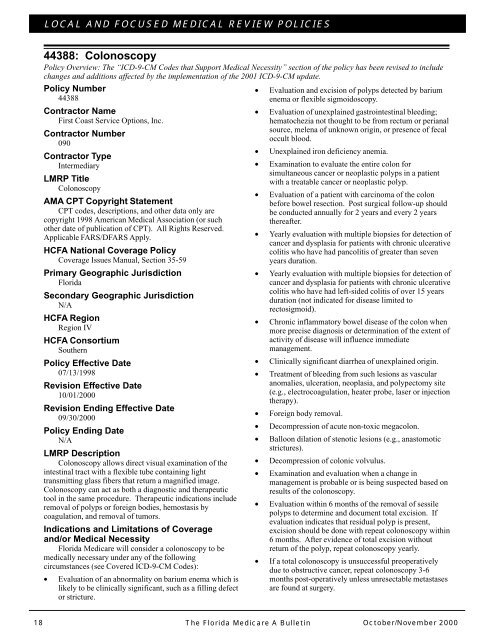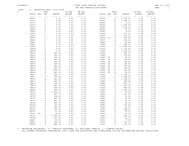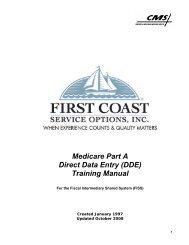Oct-Nov 00 Part A Bulletin - Medicare
Oct-Nov 00 Part A Bulletin - Medicare
Oct-Nov 00 Part A Bulletin - Medicare
You also want an ePaper? Increase the reach of your titles
YUMPU automatically turns print PDFs into web optimized ePapers that Google loves.
LOCAL AND FOCUSED MEDICAL REVIEW POLICIES<br />
44388: Colonoscopy<br />
Policy Overview: The “ICD-9-CM Codes that Support Medical Necessity” section of the policy has been revised to include<br />
changes and additions affected by the implementation of the 2<strong>00</strong>1 ICD-9-CM update.<br />
Policy Number<br />
44388<br />
Contractor Name<br />
First Coast Service Options, Inc.<br />
Contractor Number<br />
090<br />
Contractor Type<br />
Intermediary<br />
LMRP Title<br />
Colonoscopy<br />
AMA CPT Copyright Statement<br />
CPT codes, descriptions, and other data only are<br />
copyright 1998 American Medical Association (or such<br />
other date of publication of CPT). All Rights Reserved.<br />
Applicable FARS/DFARS Apply.<br />
HCFA National Coverage Policy<br />
Coverage Issues Manual, Section 35-59<br />
Primary Geographic Jurisdiction<br />
Florida<br />
Secondary Geographic Jurisdiction<br />
N/A<br />
HCFA Region<br />
Region IV<br />
HCFA Consortium<br />
Southern<br />
Policy Effective Date<br />
07/13/1998<br />
Revision Effective Date<br />
10/01/2<strong>00</strong>0<br />
Revision Ending Effective Date<br />
09/30/2<strong>00</strong>0<br />
Policy Ending Date<br />
N/A<br />
LMRP Description<br />
Colonoscopy allows direct visual examination of the<br />
intestinal tract with a flexible tube containing light<br />
transmitting glass fibers that return a magnified image.<br />
Colonoscopy can act as both a diagnostic and therapeutic<br />
tool in the same procedure. Therapeutic indications include<br />
removal of polyps or foreign bodies, hemostasis by<br />
coagulation, and removal of tumors.<br />
Indications and Limitations of Coverage<br />
and/or Medical Necessity<br />
Florida <strong>Medicare</strong> will consider a colonoscopy to be<br />
medically necessary under any of the following<br />
circumstances (see Covered ICD-9-CM Codes):<br />
• Evaluation of an abnormality on barium enema which is<br />
likely to be clinically significant, such as a filling defect<br />
or stricture.<br />
• Evaluation and excision of polyps detected by barium<br />
enema or flexible sigmoidoscopy.<br />
• Evaluation of unexplained gastrointestinal bleeding;<br />
hematochezia not thought to be from rectum or perianal<br />
source, melena of unknown origin, or presence of fecal<br />
occult blood.<br />
• Unexplained iron deficiency anemia.<br />
• Examination to evaluate the entire colon for<br />
simultaneous cancer or neoplastic polyps in a patient<br />
with a treatable cancer or neoplastic polyp.<br />
• Evaluation of a patient with carcinoma of the colon<br />
before bowel resection. Post surgical follow-up should<br />
be conducted annually for 2 years and every 2 years<br />
thereafter.<br />
• Yearly evaluation with multiple biopsies for detection of<br />
cancer and dysplasia for patients with chronic ulcerative<br />
colitis who have had pancolitis of greater than seven<br />
years duration.<br />
• Yearly evaluation with multiple biopsies for detection of<br />
cancer and dysplasia for patients with chronic ulcerative<br />
colitis who have had left-sided colitis of over 15 years<br />
duration (not indicated for disease limited to<br />
rectosigmoid).<br />
• Chronic inflammatory bowel disease of the colon when<br />
more precise diagnosis or determination of the extent of<br />
activity of disease will influence immediate<br />
management.<br />
• Clinically significant diarrhea of unexplained origin.<br />
• Treatment of bleeding from such lesions as vascular<br />
anomalies, ulceration, neoplasia, and polypectomy site<br />
(e.g., electrocoagulation, heater probe, laser or injection<br />
therapy).<br />
• Foreign body removal.<br />
• Decompression of acute non-toxic megacolon.<br />
• Balloon dilation of stenotic lesions (e.g., anastomotic<br />
strictures).<br />
• Decompression of colonic volvulus.<br />
• Examination and evaluation when a change in<br />
management is probable or is being suspected based on<br />
results of the colonoscopy.<br />
• Evaluation within 6 months of the removal of sessile<br />
polyps to determine and document total excision. If<br />
evaluation indicates that residual polyp is present,<br />
excision should be done with repeat colonoscopy within<br />
6 months. After evidence of total excision without<br />
return of the polyp, repeat colonoscopy yearly.<br />
• If a total colonoscopy is unsuccessful preoperatively<br />
due to obstructive cancer, repeat colonoscopy 3-6<br />
months post-operatively unless unresectable metastases<br />
are found at surgery.<br />
18 The Florida <strong>Medicare</strong> A <strong>Bulletin</strong><br />
<strong>Oct</strong>ober/<strong>Nov</strong>ember 2<strong>00</strong>0





